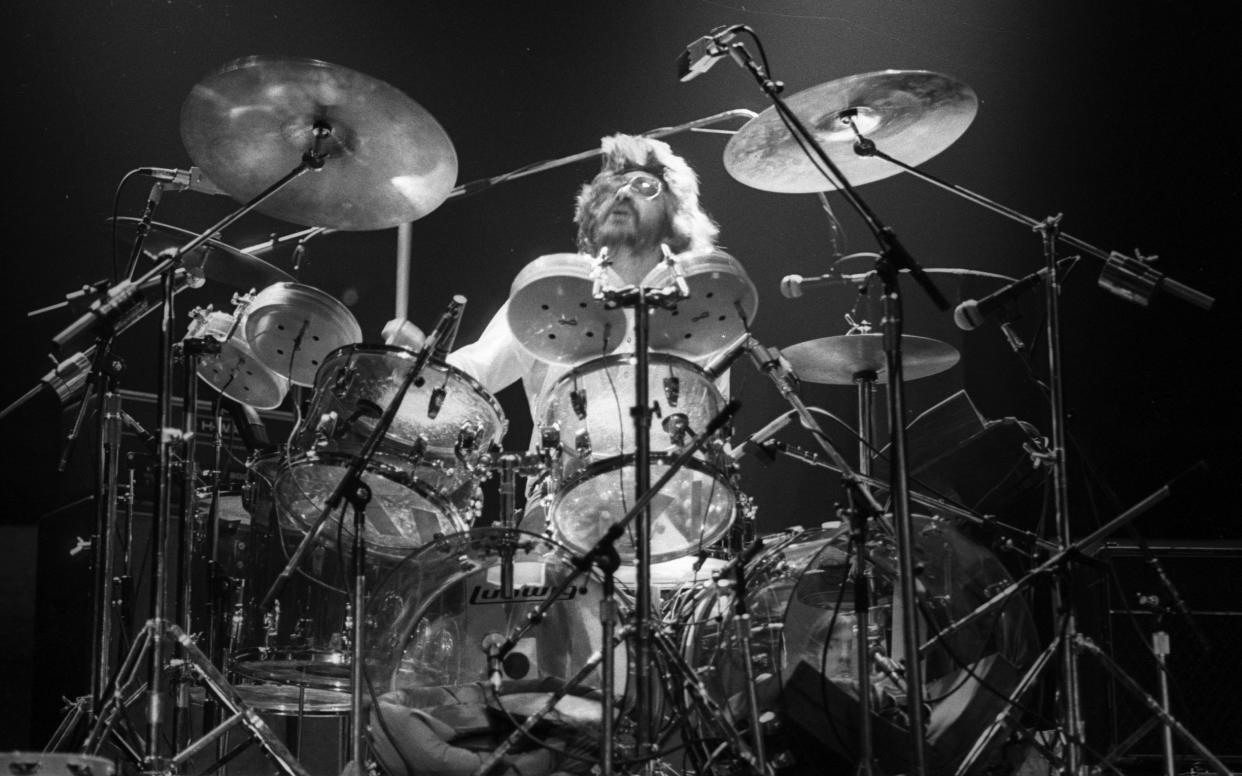Graeme Edge, drummer and wordsmith for the Moody Blues, giants of symphonic rock – obituary

Graeme Edge, the drummer and songwriter who has died aged 80, was a co-founder of the Moody Blues, who went far beyond their rhythm’n’blues roots; the last surviving touring member of the original line-up, he was the only one of the band to play on every album, and contributed several songs, as well as some fondly remembered if slightly portentous spoken-word passages as they blazed a trail for what became known as “symphonic rock”.
Graeme Charles Edge was born at Rocester in Staffordshire on March 30 1941; his father had been a music hall singer, while his mother had played piano in cinemas during the silent era; the family moved to Birmingham when he was a baby.
He developed a passion for poetry at an early age. “When I was about 10 years old we had to do a composition in English class and I wrote it all in rhyme. And the teacher was saying, ‘That’s kind of interesting.’ He took me under his wing and he gave me poems – T S Eliot, Dylan Thomas. I’ve had a lifelong love ever since.”
After leaving school he began training as a draughtsman while taking his first steps in the music business by managing local bands; when the drummer of one of them left abruptly, he made his move behind the kit.

The Moody Blues came together in 1964 when Edge joined forces with the guitarist Denny Laine (later of Wings), bassist Clint Warwick, keyboard player Mike Pinder and singer and flautist Ray Thomas. They initially called themselves the MB 5, hoping to secure financial backing from the local Mitchell & Butler brewery. When that failed to materialise they settled on the name they would carry forward over the decades. They released a single that missed the charts, but did appear on Ready Steady Go!, and the follow-up, Go Now, went to No 1.
Their 1965 debut album, The Magnificent Moodies, had a beat-group feel, but when the r’n’b enthusiast Denny Laine departed, along with Clint Warwick, the band – strapped for cash and looking for a way forward – took a less-travelled road. The singer and guitarist Justin Hayward and bassist John Lodge were recruited and the Moodies began to think more ambitiously.
The result was their landmark 1967 concept album, Days of Future Passed, recorded with the London Festival Orchestra and featuring the ethereal sound of Mike Pinder’s Mellotron. With its conceit of using the passing of a single day as a metaphor for life, it was one of the first great prog-rock albums, and marked the first appearance of Edge the poet.
He had been writing what he intended as a song lyric for the album, but when the band told him “There are just too many words,” the producer Tony Clarke suggested: “Make it a poem.” The result was spoken-word segments that opened the album and bookended the extended version of what became the band’s best-known hit, Nights in White Satin.
They were delivered by Pinder, with his whisky-and-cigarettes voice. The album began: “Cold-hearted orb that rules the night / Removes the colours from our sight / Red is grey and yellow white / But we decide which is right / And which is an illusion.”
The album only reached No 27 in the UK but went top-three in the US and provided the band with their winning formula. On the follow-up, In Search of the Lost Chord, Edge opened with his poem, “Departure”, while Pinder narrated “The Word” later on the album. (But when the pair fell out after Pinder told Edge “shut up – you’re just the drummer,” the pianist left the band, and they did not speak for several decades.)
After five more critically and commercially successful albums the band took a break in 1974. Edge formed the Graeme Edge Band and released several records, including the album Kick Off Your Muddy Boots, which featured a guest spot from Ginger Baker.
The Moodies reconvened in 1978, and with various line-up permutations released eight more studio albums over the years while maintaining a busy touring schedule, including a series of “Moody Blues Cruises”, featuring the band and guest artists such as Jefferson Starship and the Strawbs.

In latter years Edge’s health problems meant that there was usually a second drummer on stage: in 2016 he had a stroke, subsequently telling the audience at a gig in Las Vegas that “my life flashed before my eyes,” adding: “I have some repenting to do.”
In 2012 he published The Written Works of Graeme Edge, a limited-edition book of poems and back-stories. In 2018 the actor Jeremy Irons delivered his words on the album Days of Future Passed Live.
Away from music, Edge was a Birmingham City fan, and enjoyed American football, sailing and golf. He was also a sci-fi fan and “Trekkie” (with Deep Space Nine a particular favourite). He made a round-the-world voyage on his yacht Delia and was asked a few years ago if he would he like to repeat the feat.“I would love to,” he replied. “But I’m 72. I have a powerboat.”
Graeme Edge married, in 1969, a model, Carol, whom he had met at the celebrated Bag O’ Nails club in Soho. They had a daughter but divorced after two years, and he married, secondly, a typist, Sue; he recalled that she was initially reluctant to become his wife as her married name would have sounded like “sewage”.
They had a son but also divorced, and in 1998 he married Amanda, who he nicknamed “the Commander”, and with whom he lived in Florida. She survives him, along with his children.
Graeme Edge, born March 30 1941, died November 11 2021

 Yahoo News
Yahoo News 
